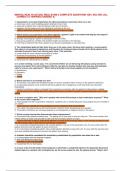Exam (elaborations)
MENTAL HEALTH ACTUAL REAL EXAM 2 COMPLETE QUESTIONS 100% SOLVED (ALL CORRECT & VERIFIED) GRADED A+
- Course
- NURS MISC
- Institution
- Columbia College (CC )
MENTAL HEALTH ACTUAL REAL EXAM 2 COMPLETE QUESTIONS 100% SOLVED (ALL CORRECT & VERIFIED) GRADED A+
[Show more]



